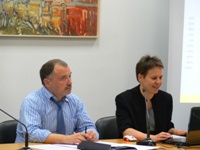Registration
You will receive an email confirming your registration.
IMGXYZ2513IMGZYXAs a new round of Russian-EU negotiations on visa-free travel begins, the difficult task of improving the process by which citizens of Russia and the CIS obtain Schengen visas remains.
The results of an international survey organized by the Stefan Batory Foundation (Poland) demonstrate just how difficult it is for citizens of post-Soviet countries to obtain visas to the twenty-five countries party to the Schengen agreement. The survey was conducted in Moscow, Kiev, Minsk, and Chisinau and covered the embassies of eight Schengen countries and the United Kingdom. The Carnegie Moscow Center, which coordinated the survey in Russia, added to the standard program a series of interviews with the heads of the consular services of the respective countries. The Center recently published a separate report (in Russian) on the project’s findings.
Carnegie’s Sam Greene and Nikolay Petrov moderated a presentation of the study.
Results
According to Joanna Konieczna-Sałamatin of the Stefan Batory Foundation, the study revealed the need for a massive simplification and acceleration of the visa application process for citizens of Eastern European states. The problem, however, is not the visa application process alone: only 18 million Russian citizens, for example, have foreign travel passports, which have to be supplied by the Russian government through an application process. This means that only 13 percent of the population has the potential to travel abroad.
The prospects for visa-free regime between Russia and EU
Nikolay Petrov named three key obstacles to a visa-free regime between Russia and Europe:
- The open border with CIS neighbors. The Russian Federation borders the densely populated and impoverished states of Central Asia. Strengthening these borders would imply huge investments and weaken the Kremlin’s influence in the region. On the other hand, agreement on readmission imposes certain liabilities on Moscow if citizens from the CIS illegally enter the EU from Russian territory and requires to return them to the countries of origin. This could become a serious financial burden.
- The problem of Caucasus. Given the increasing instability in southern Russia, there is a continual flow of political asylum seekers and refugees to Europe, which complicates relations between Moscow and Brussels.
- Corruption. European officials are not confident that all Russian international passports are received legally and following required procedures. It is necessary to make this process more transparent.
Borja Cortés-Bretón of the Spanish Embassy, which currently holds the rotating EU presidency, argued that long-term visas and other instruments might ameliorate the current situation. He suggested that allowing the issuance of two-, three-, or even five-year visas would in practice amount to a virtual visa-free zone.
The discussion also included presentations from Alexandru Platon of the Soros Foundation-Moldova, which implemented the study in that country, and Yulia Makhnutina of Validata, which conducted the fieldwork in Moscow. Participants, who included representatives of embassies of Australia, Belarus, Vatican, Spain, Latvia, Lithuania, Norway, Portugal, Romania, Slovakia, Ukraine, Finland, the Czech Republic, and Estonia, suggested that a parallel study be conducted of Russian consular services in EU member states.
